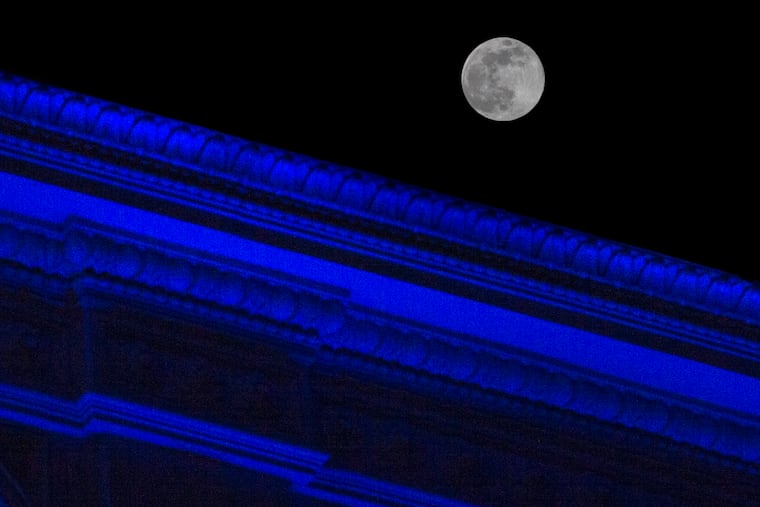‘Snow moon’ is coming this weekend, and it might be why you’re sleeping less
In the nights leading up to a full moon, study subjects slept up to 46 to 58 minutes less than they did during other nights in the lunar cycle.

With the moon gaining ever-increasing power this week and beaming on those ice-lacquered layers and pompadours of the remnant snowpack, the nightscapes in parts of the region have evoked the lunar surface itself.
But with the so-called Snow Moon approaching fullness, that “lustre of midday” — to quote the world’s most famous Christmas poem — might have been keeping you awake, according to a recently published study led by a team of University of Washington researchers.
They found that on the nights preceding the full moon, the study subjects slept from 46 to 58 minutes less than they did during the earlier and later lunar cycles.
They acknowledged that the findings ran counter to previous sleep analyses involving Earth’s pockmarked satellite, which through the years has been the subject of innumerable studies on how it might affect human behavior, not to mention werewolves.
» READ MORE: Humans have long been fascinated by the moon
But the sleep impacts the UW-led team identified and reported last month in the journal Science Advances were evident “even on clouded nights,” Leandro Casiraghi, the study’s lead author, said Thursday.
And he said these sleep issues likely have something do with our deep, dark pasts, which perhaps weren’t as dark when the moon was dominating the night sky.
What they found
The researchers from UW, the National University of Quilmes in Argentina, and Yale University used wrist monitors to track the sleep habits of 98 residents of Argentina’s Roba/Qom community, some who lived with electricity and some without, for a three-year period.
Similarly, for a three-year period, they monitored the sleep patterns of 464 Seattle-area college students, all of whom presumably had access to electric lights.
The results were surprising, they said.
“Unexpectedly, the changes in sleep duration and onset throughout the moon cycle resembled those of the Toba/Qom people,” the authors wrote.
» READ MORE: The high cost of getting a good night's sleep
The effects clearly were related to how early the moon rose, they said, which determined how early it would reach peak illumination and how much moonlight would be available in the hours after the sun went to bed. The additional light theoretically would entice people to stay up later.
The moon comes up later each day as it approaches the big moment. For example, on Thursday it rose just before 4 p.m., and Friday, it will rise at 5:08 p.m., so it follows that the peak sleep effects occurred a few days before the full moon and lessened as the moon rose later and provided less light in the early evening.
The Snow Moon, so-called because, yes, February tends to be a snowy month in the North Temperate Zone, won’t show up until after 6 on Friday evening and will reach fullness at 3:17 a.m. EST Saturday. The study concluded that once the moon reaches 100%, the sleep effects wane, along with the moon.
“Together, these results strongly suggest that human sleep is synchronized with lunar phases regardless of ethnic and sociocultural background, and of the level of urbanization,” they wrote.
But just why would someone who could turn on the lights with a flick of a switch be subjected to moon phases?
About that deep, dark past
The best guess is that it all has to do with the “ancestral effect of moonlit evenings,” they concluded.
“Our data seem to show that humans — in a variety of environments — are more active and sleep less when moonlight is available during the early hours of the night. This finding, in turn, suggests that the effect of electric light on modern humans may have tapped into an ancestral regulatory role of moonlight on sleep.”
» READ MORE: Pandemic sleep issues persist as some battle ‘COVID-somnia,’ while others rest more
They also postulated that it might have something to do with gravity. While the difference in the tide-driving gravitational pull of the new and full moons is “indistinguishable,” the full moon does its pulling at night.
“This raises the possibility that moon gravity could have a time-of-day specific effect on sleep,” the study authors said.
In any event, they wrote, “it is hard to conceive that the conserved synchronization between sleep and the moon cycle that we report occurred by chance.”